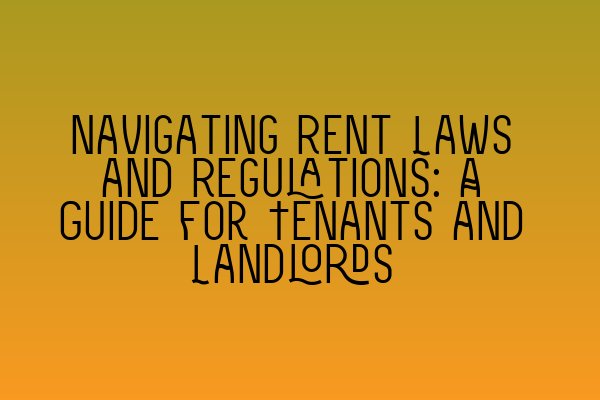Navigating Rent Laws and Regulations: A Guide for Tenants and Landlords
Welcome to our comprehensive guide on navigating rent laws and regulations for both tenants and landlords. Renting a property can be a complex process, with numerous legal requirements and obligations to consider. Understanding your rights and responsibilities under rent laws is crucial to maintaining a harmonious and legally compliant tenancy agreement.
In this article, we will break down the key aspects of rent laws while providing practical guidelines for tenants and landlords. Whether you’re a tenant looking for information on your rights or a landlord seeking clarity on your legal obligations, this guide will help you navigate the intricate terrain of rent laws in the UK.
Key Rent Laws and Regulations in the UK
Before we delve into the specifics, let’s briefly outline some of the key rent laws and regulations in the UK:
- Rental Tenant Act of 1995
- Housing Act of 1988
- Landlord and Tenant Act of 1954
- Tenancy Deposit Protection Scheme
- Health and Safety Rating System
These laws and regulations provide the framework within which tenancy agreements and the landlord-tenant relationship operate. It is important to familiarize yourself with these laws to ensure compliance and protect your rights.
For Tenants: A Guide to Your Rights
Tenants have several rights under UK rent laws, designed to ensure fair and transparent rental agreements. Understanding these rights will empower you to protect yourself and resolve any disagreements that may arise during the tenancy.
1. Right to a Written Tenancy Agreement
As a tenant, you have the right to request a written tenancy agreement from your landlord. This document outlines the terms of the tenancy, including rent amount, duration, and any other relevant conditions. A written agreement provides legal certainty and protects your rights throughout the tenancy.
2. Right to a Safe and Habitable Property
Your landlord has a legal obligation to provide a safe and habitable property. This means that the property should meet basic health and safety standards, be free from hazards, and have necessary amenities in working order. If you encounter any issues with the property’s condition, it is important to inform your landlord promptly.
3. Right to Privacy
While your landlord has the right to access the property for inspections or repairs, they must provide reasonable notice and obtain your consent. Your right to privacy ensures that you can enjoy your rented space without unnecessary intrusion.
4. Right to Protection against Unfair Eviction
Under the Rent Acts, landlords must follow a specific legal procedure if they wish to evict a tenant. As a tenant, you have the right to challenge an eviction and seek legal advice if you believe it to be unjust or illegal.
For a more detailed look at your rights as a tenant and the legal protections available to you, check out our article on Updates in UK Property Laws: Key Changes and Implications.
For Landlords: A Guide to Your Obligations
Being a landlord comes with specific legal obligations that must be met in order to maintain a lawful and harmonious tenancy. Understanding these obligations will help you navigate the challenges of being a responsible landlord.
1. Obligation to Provide a Safe and Habitability Property
As a landlord, you are responsible for ensuring that the property meets the necessary health and safety standards. Regular maintenance and necessary repairs should be carried out promptly to provide a safe and habitable environment for your tenants.
2. Compliance with Tenancy Deposit Protection Scheme
When taking a tenancy deposit, it is essential to comply with the Tenancy Deposit Protection Scheme. This scheme protects the tenant’s deposit and provides a fair resolution process should any disputes arise at the end of the tenancy.
3. Properly Serve Section 21 Notices
If you wish to end a tenancy, you must properly serve a Section 21 notice to the tenant. Failing to follow the correct procedure can render your notice invalid, leaving you unable to regain possession of your property.
4. Maintain Records and Provide Required Documents
As a landlord, it is crucial to maintain accurate records and provide your tenants with required documents such as gas safety certificates, Energy Performance Certificates (EPCs), and the How to Rent checklist. This ensures compliance with regulations and protects your interests.
For a more in-depth understanding of your obligations as a landlord, we recommend reading our comprehensive guide on Legal challenges in property transactions: A comprehensive guide.
Seeking Legal Advice
Navigating rent laws can be complex, and it is always advisable to seek legal advice when facing significant issues or disputes. A property law professional can provide guidance tailored to your situation, helping you make informed decisions and protect your rights or interests.
If you wish to learn more about lease laws in the UK, our article on Navigating Lease Laws in the UK: Essential Guidelines for Tenants and Landlords provides a comprehensive overview.
Conclusion
Understanding and navigating rent laws and regulations is crucial for both tenants and landlords. By familiarizing yourself with your rights and obligations, you can ensure a fair and legally compliant tenancy. Seeking legal guidance when needed is always advisable to protect your interests.
For a broader understanding of property law and to avoid common pitfalls, make sure to check out our article on Dominate Property Law Questions: Avoiding Common Pitfalls.
Lastly, if you need assistance with land law exam preparation, our expert tips in our article on Land Law Revision Tips: Ace Your Exam Preparation will help you succeed.
We hope this guide has helped you navigate the complexities of rent laws and regulations. Remember, staying informed and seeking professional advice when needed is key to a successful tenancy.
